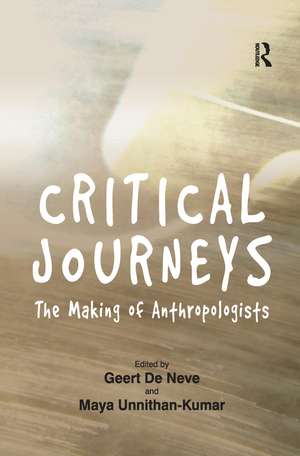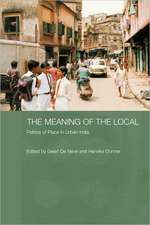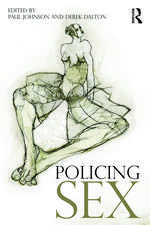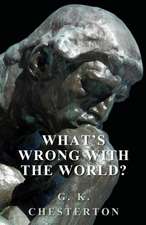Critical Journeys: The Making of Anthropologists
Autor Geert De Neve, Maya Unnithan-Kumaren Limba Engleză Paperback – 15 noi 2016
| Toate formatele și edițiile | Preț | Express |
|---|---|---|
| Paperback (1) | 469.34 lei 6-8 săpt. | |
| Taylor & Francis – 15 noi 2016 | 469.34 lei 6-8 săpt. | |
| Hardback (1) | 1056.00 lei 6-8 săpt. | |
| Taylor & Francis – 28 iul 2006 | 1056.00 lei 6-8 săpt. |
Preț: 469.34 lei
Nou
Puncte Express: 704
Preț estimativ în valută:
89.82€ • 93.43$ • 74.15£
89.82€ • 93.43$ • 74.15£
Carte tipărită la comandă
Livrare economică 12-26 aprilie
Preluare comenzi: 021 569.72.76
Specificații
ISBN-13: 9781138262638
ISBN-10: 1138262633
Pagini: 220
Dimensiuni: 156 x 234 mm
Greutate: 0.45 kg
Ediția:1
Editura: Taylor & Francis
Colecția Routledge
Locul publicării:Oxford, United Kingdom
ISBN-10: 1138262633
Pagini: 220
Dimensiuni: 156 x 234 mm
Greutate: 0.45 kg
Ediția:1
Editura: Taylor & Francis
Colecția Routledge
Locul publicării:Oxford, United Kingdom
Notă biografică
Geert De Neve is a Senior Lecturer in Social Anthropology at the University of Sussex, UK. He has conducted extensive fieldwork in Tamilnadu, India. He is interested in issues of anthropology and globalisation, as well as processes of migration, modernity and social transformation. He has published various articles on these topics, and co-edited a book. Maya Unnithan-Kumar is Reader in Social Anthropology at the University of Sussex, UK. She has conducted extensive fieldwork in Rajasthan in North West India and more recently in the UK. Her research interests include kinship, gender and caste in South Asian anthropology, and childbirth, maternal health and reproductive rights in the Anthropology of Reproduction. Maya has published a number of articles, a monograph and several co-edited volumes on these topics.
Recenzii
’The contributors offer succinct, professional biographies which remind us what reflexivity, in its most helpful sense, contributes. This volume will inspire intending anthropologists by example, reassure new fieldworkers that others have thrived on serendipity, and remind established anthropologists how uncertainly they set out, and how much their own journeys have owed to their local co-workers.’ Richard Fardon, School of Oriental and African Studies, University of London, UK ’Critical Journeys brings reflexivity back as a powerful theoretical insight and methodological tool, far removed from self-indulgent navel-gazing. Each author presents an ethnography of ethnographic practice, treating seriously for what would seem to be the first time the role played by assistants and others, as well as the informants in co-producing anthropological knowledge. The volume will stand the test of time and should be essential reading for those undertaking fieldwork for the first time, and for all anthropologists seeking to understand the discipline's relation to the world it inhabits.’ Marcus Banks, University of Oxford, UK ’Taken together, the papers reveal insights into the making of anthropologists through their engagement with the field and in the production of texts from their fieldwork...I enjoyed the balance and the sense of vibrancy displayed in this book. It contributes usefully to a body of knowledge that will assist teachers, and especially postgraduate students, in the central task of relating fieldwork to text.’ Anthropological Forum '...good reading... One of the aims of the book is to demonstrate that there is 'never just one way of being an anthropologist' (p. 13), and in this it succeeds.' Journal of the Royal Anthropological Institute
Cuprins
Preface and Acknowledgements; Chapter 1 Introduction: Producing Fields, Selves and Anthropology, Maya Unnithan-Kumar, Geert De Neve; Chapter 2 ‘What I want is for Florida orange growers to know why it is important for us to whale’: Learning to be an Anthropologist in the Field, Barbara Bodenhorn; Chapter 3 The Multi-Sited Ethnographer, Simon Coleman; Chapter 4 Others In and Of the Field: Anthropology and Knowledgeable Persons, Narmala Halstead; Chapter 5 Hidden Reflexivity: Assistants, Informants and the Creation of Anthropological Knowledge, Geert De Neve; Chapter 6 Writing as a Kind of Anthropology: Alternative Professional Genres, Anthony Good; Chapter 7 Among the Crowds: Learning Anthropology and Learning Multidisciplinarity, Rachael Gooberman-Hill; Chapter 8 Sensing the Field: Kinship, Gender and Emotion in an Anthropologist’s Way of Knowing, Maya Unnithan-Kumar; Chapter 9 Part icipant Experience: Learning to be an Acupuncturist, and Not Becoming One, Elisabeth Hsu; Chapter 10 ‘Working in the Metropolis’: Reflections on Gender and Fieldwork in the City, Henrike Donner; Chapter 11 The Silence in Between: Governmentality and the Academic Voice in Tibetan Diaspora Studies, Martin A. Mills;
Descriere
Through an 'ethnography of ethnographers', this volume explores the varied ways in which anthropologists become and remain attracted to the discipline. These original and critical contributions provide fascinating insights into the relationship between anthropologists and the nature of the discipline.

















